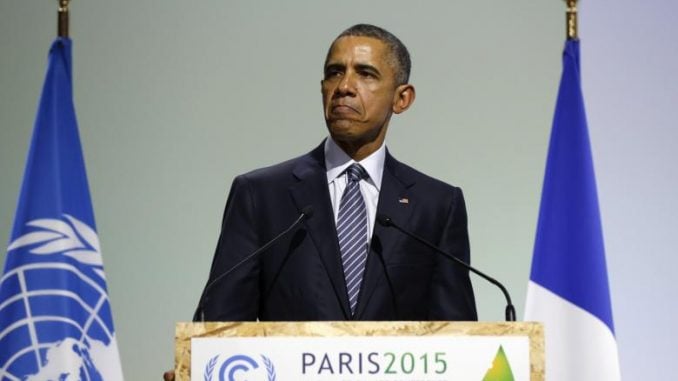
Several times over the past couple of years, I have asked this question of supporters of Barack Obama’s executive actions, accomplished without the cooperation of Congress:”Will you be as happy to see a Republican president in the White House use those same executive, unilateral powers to a) unwind all of Obama’s executive, unilateral actions and/or b) bind the U.S. to policies that only he and his political party want to see passed?”The Paris Accord is the latest casualty of that failure to adhere to the U.S. Constitution as currently written. What was written and signed essentially by one man in the three-part governing system of the United States has now been upended by another man with the stroke of a pen and one press conference.Setting aside all the arguments for and against controlling carbon emissions, what should Obama have done to make sure the U.S. would abide by and adhere to the Paris climate accord:Submit it to the U.S. Senate for ratification as a treaty.No doubt it would have been difficult to get it through the Senate with the two-thirds votes necessary for ratification. Consider the enormous challenge faced by President Abraham Lincoln when he wanted to pass the 13th Amendment to the Constitution to abolish slavery. The process started in the Senate in 1864 before the elections that fall, when it looked like Lincoln might lose because of the duration of the Civil War. Lincoln lobbied, cajoled, and persuaded enough House and Senate members to get to the two-thirds majorities necessary to send the proposed amendment to the states for ratification. In the Steven Spielberg movie “Lincoln,” passage of such controversial legislation was not based solely on lofty philosophical musings and speeches, but on cold hard deal-making, job offers, and political jockeying. That is the real world of politics and legislation. It does not operate in a vacuum or in some sterilized laboratory. It happens on Capitol Hill, state legislatures, and municipal councils and commissions every day. Obama chose not to do the “dirty work” of passing such a controversial piece of legislation, this time in the form of a binding treaty, to ratify the Paris Accord that only he signed, not the U.S. government as a whole. So far into the 5½ months of Obama’s retirement, thousands of his unilateral executive actions have been reversed or canceled in their entirety; thousands of pages of regulations put forth by his administration are now being unwound or reversed by the new administration; his ban against the construction of the Keystone Pipeline has been lifted; his fuzzy “red line” drawn against Syria has been obliterated, and now his unilateral acceptance of the terms of Paris has been reversed. The only major thing that has not been reversed yet, for those who supported Obama and his term in office? The Affordable Care Act. Obamacare. Why? Because it was duly passed through both the House of Representatives and the Senate and signed into law by Obama in compliance with the Constitution. Until a majority of the House and Senate can pass something either to repeal it in its entirety or replace it with something else, the ACA will remain the law of the land.We have a Constitution for a reason. Read it every now and then to remind yourself of the incredible foresight our first generation of elected leaders had to look far into the future and implement ways to limit the powers of one person in this country to run things without the consent of the majority of citizens as expressed through elected representatives, not public opinion polls.Frank Hill is the director of The Institute for the Public Trust in Raleigh.



